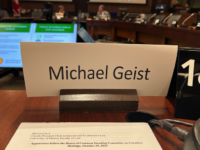The government, led by AI Minister Evan Solomon, is currently conducting a short consultation on AI regulation that has attracted criticism for its short time frame. At the same time however, the Standing Committee on Canadian Heritage has been working through a study on AI and the creative sector that may be more limited in scope, but has featured a broader range of perspectives. I had the opportunity to appear before the committee yesterday where I lamented that too often debates on new technology is framed “as a threat, emphasizes cross-industry subsidies, and misses the opportunities new technology presents. We therefore need risk analysis that rejects entrenching the status quo and instead assesses the risks of both the technology and the policy response. I’ll post the full discussion (which ventured into AI transparency, copyright, the news sector, and much more) in a future Law Bytes podcast episode. In the meantime, my opening statement is embedded and posted below.
Post Tagged with: "copyright"
TIFF Removes October 7th Documentary Film From Schedule Citing Implausible Copyright Clearance Concerns From Hamas Terror Footage
The Toronto International Film Festival has removed from its 2025 schedule a documentary film by Canadian filmmaker Barry Avrich that tells the story of Noam Tibon’s mission to save his family during the October 7th attacks by Hamas in Israel. The film is based on the excellent book by Amir Tibon, the Gates of Gaza, which recounts both the rescue effort and the longstanding fraught relationship between Israel and Gaza. According to Deadline, the film, titled The Road Between Us: The Ultimate Rescue, was scheduled to be included in the program announced last week. But TIFF asked that the source of Hamas body-cam footage included in the film be identified and to provide copyright clearances for the video. You read that correctly: TIFF wanted the filmmakers to obtain copyright licences from Hamas terrorists.
The Year in Review: Top Ten Posts
Last week’s Law Bytes podcast featured a look at the year in review in digital law and policy. Before wrapping up for the year, the next three posts over the holidays will highlight the most popular posts, podcast episodes, and Substacks of the past year. Today’s post starts with the top posts, which starts with a major copyright ruling involving fair dealing and digital locks. The remaining posts include four posts on the Online Harms Act and two on Bill S-210, alongside posts on the implementation of Bills C-11, C-18, and the recent decision to ban TikTok from operating in Canada.
The Law Bytes Podcast, Episode 223: Looking Back at the Year in Canadian Digital Law and Policy
Canadian digital law and policy in 2024 featured the long-delayed online harms bill, controversial implementation of streaming and online news legislation, as well as a myriad of notable copyright, AI, and privacy court cases. Government legislation stalled in the House of Commons, but with trade battles over a digital services tax, a competition case against Google, and plans to kick TikTok out of the country, there were no shortage of high profile issues. For this final Law Bytes podcast of 2024, I go solo without a guest to talk about the most significant developments in Canadian digital policy from the past year.
The Law Bytes Podcast, Episode 222: Robert Diab on Canadian Media’s Copyright Lawsuit Against OpenAI
Canada’s largest media companies came together recently to file a copyright infringement lawsuit against OpenAI, the owners of ChatGPT. I wrote about the suit, suggesting that the primary motivation behind the suit was likely the hope to kickstart settlement discussions with the hope of a licence. Robert Diab, a law professor at Thompson Rivers University, raised similar thoughts in his own piece on the lawsuit. Robert joins the Law Bytes podcast to discuss the case and its implications for copyright and AI in Canada.











